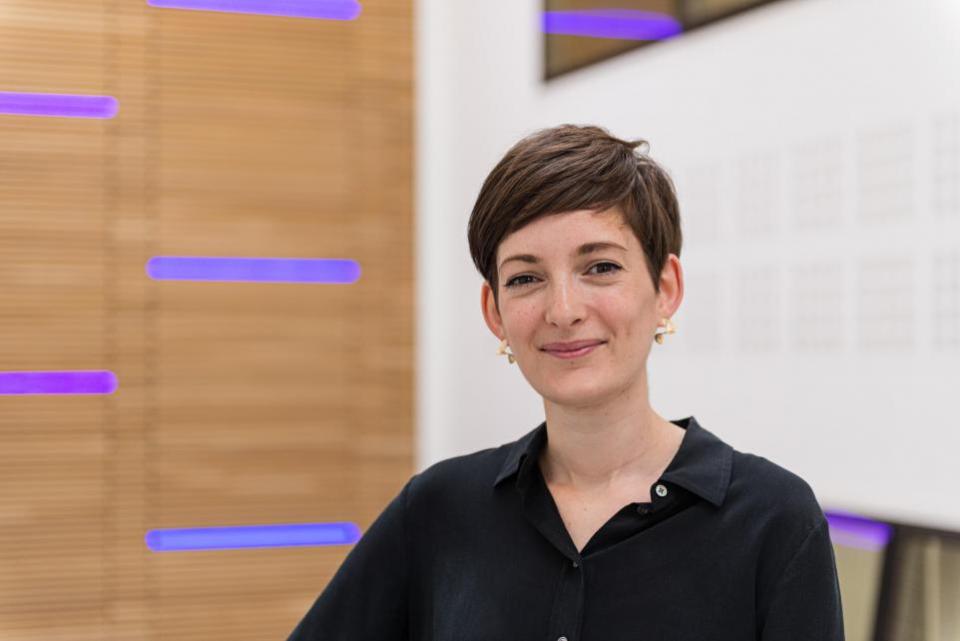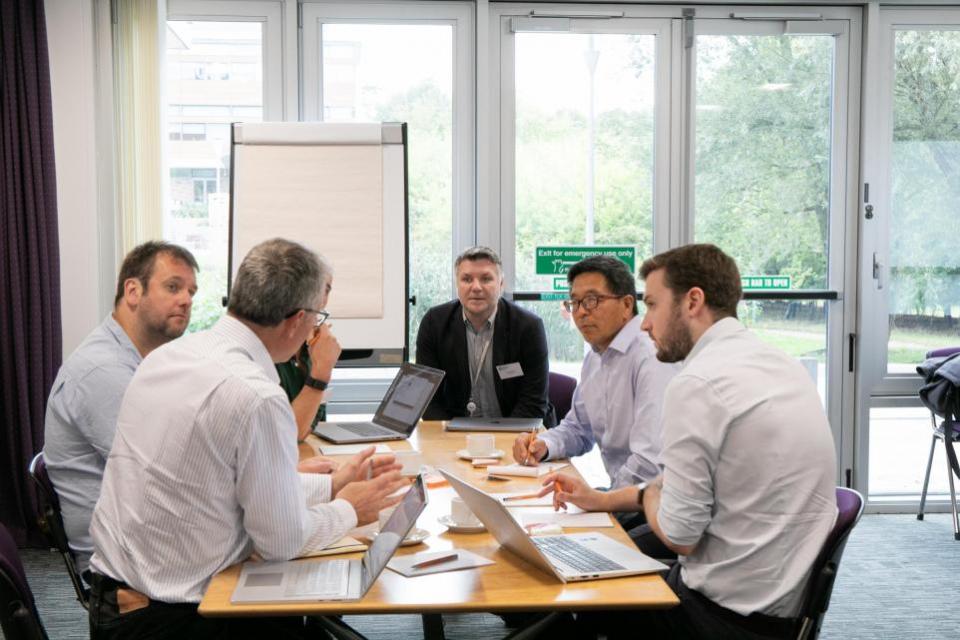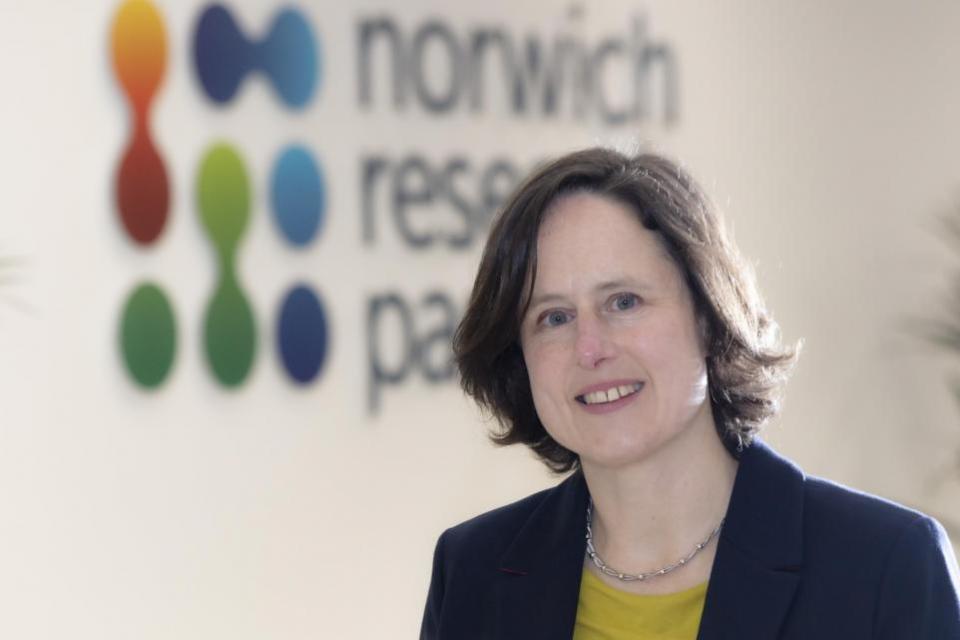A new initiative run by Anglia Innovation Partnership, the science park management organization at Norwich Research Park, aims to bring together researchers and industry representatives for interdisciplinary collaboration that could result in major breakthroughs to some of the world’s biggest challenges in food, health and climate change.
Today there are much closer links between academic research and industry as we seek to tackle some of the major global challenges we face in food security, agriculture, crop resistance, climate change and human health. And to make this easier, an initiative from Dr Kirsty Culley of Anglia Innovation Partnership aims to connect companies with researchers at Norwich Research Park to develop solutions to some of these problems.

Dr. Kirsty Culley from Anglia Innovation Partnership (Image: Chris Ball Photography)
The Explorer Forum programme, part of the wider Anglia Innovation Partnership Enterprise Strategy, brings together people from both academia and industry on topics of shared interests to explore collaborative solutions and opportunities. Depending on the topic, this can range from all-day facilitated workshops, visits to other locations of interest and tailor-made industry visits to the park.
The program can provide funding of up to £5,000 to enable exploratory meetings and activities between the research and business communities to identify new innovations that have the potential to tackle some of the key global challenges we face.
A good example of this approach that has a direct, positive impact is in the field of gene editing for the sugar beet industry. Last year the government passed the Precision Breeding Bill, which allows plants to be genetically edited to improve traits such as yield, disease resistance or ripening time.
Gene editing only removes or duplicates genes that already exist in a crop, no foreign genes are introduced. It means that results normally achieved by natural crosses can be achieved almost immediately over many years – a real advantage when it comes to the speed at which some of the global challenges we face are developing.
Sugar beet is a very important crop in the east of England, where some of British Sugar’s main processing plants are located at Bury St. Edmunds and Cantley. The industry as a whole supports around 9,000 jobs in the UK and supplies more than 50% of the country’s sugar demand.


One of the Explorer Forum workshops focused on gene editing for the sugar beet industry (Image: Getty Images)
An all-day Explorer Forum workshop, facilitated by innovation specialists from Downstream Innovation, was organized to explore new options that gene editing could offer the sugar beet industry, including disease resistance, improving crop yields and developing new strains.
Representatives from the British Beet Research Organization (BBRO), Tropic, a pioneering agricultural biotech company (both based in Norwich Research Park), British Sugar, the National Farmers’ Union (NFU), Department for Environment, Food & Rural Affairs (DEFRA), an international seed breeding company, sugar beet growers and scientists from Park Institutes the John Innes Center and the Earlham Institute attended the workshop to exchange ideas and explore these new opportunities to help the sugar beet industry.
One project for further consideration was the threat to sugar beets from a disease called Virus Yellows, which can have catastrophic consequences for the crop. Growers have reported yield losses of up to 80% in recent years. Current measures to combat this disease include the use of chemical-based pesticides to neutralize the aphid vector that transmits the disease. The use of these pesticides must be approved by DEFRA, but it is now accepted that this is not a sustainable long-term solution as these types of chemicals are controversial and considered by some to be harmful.
It was agreed that participants from the John Innes Centre, British Beet Research Organization (BBRO), Tropic (all based at Norwich Research Park) and British Sugar would run a project to investigate the possibilities of protecting sugar beets from the threat of Virus Yellows , by using a gene editing technology platform developed by Tropic to give the crop natural resistance to the disease.
The project found that a budget of £1 million was needed to create the gene editing programme. It has managed to secure a grant of just over £660,000 from Innovate UK’s Farming Futures R&D Fund, with the balance funded by British Sugar, Tropic and the John Innes Centre.
The gene editing route should be able to secure the sugar beet crop much more quickly than crossbreeding, radically reduce the amount of chemical pesticides used, reduce costs for farmers and ultimately consumers, and make sugar beets more profitable and therefore more profitable to make. attractive crop for farmers to grow. Yields will be better and the sugar beet industry will be more sustainable, meaning people will continue to work in it.
Dr. Kirsty Culley, scientific collaboration manager at Anglia Innovation Partnership, said: “There is so much groundbreaking research being done at Norwich Research Park that can be used to solve the industry’s key challenges.
“Bringing all expertise together in one room for a day to investigate gene editing in sugar beets turned out to be a very valuable exercise with real results. Now that we have proven that this approach can have a positive impact, we are expanding our forums into other areas and would welcome interest from industry people who would like to discuss using this method to find solutions to their challenges. ”
Another Explorer Forum visited the Silverstone Technology Cluster in Northamptonshire. It focused on uncovering opportunities for Norwich Research Park scientists to work with Silverstone’s advanced engineering companies.
Representatives from Norwich Research Park visited several Silverstone companies to establish new connections and collaborations, particularly in the areas of additive manufacturing, new carbon neutral materials, automated and vertical farming and battery technology.
The team behind UEA spin-out company Cellexcel were also present on the visit to present their work to the businesses at Silverstone. Cellexcel is developing waterproof, plant-based biocomposites that could ultimately replace plastic-based materials such as carbon fiber and fiberglass in the production of cars, aircraft and bicycles.
Carbon fiber and fiberglass produce high CO2 emissions during production. A switch to bio-based composites made from materials such as flax or hemp would make a measurable difference. Not only will they use less energy during the production process, but growing a field of hemp or flax in the first place will also absorb a significant amount of CO2.


Companies part of the Space East cluster attended an Explorer Forum workshop with researchers from Norwich Research Park to discuss the satellite sector (Image: Anglia Innovation Partnership)
Another Explorer Forum workshop was held in partnership with Space East. Companies working in space-related industries, which are part of the Space East cluster, as well as the Satellite Applications Catapult, were on hand to help Norwich Research Park researchers understand the current status, solutions and challenges of the satellite sector.
Researchers then helped the company representatives understand the potential of their science and spent time exploring synergies in areas such as positioning East Anglia as a testing ground for new technologies, developing next-generation crops, precision agriculture, soil quality, water management and use of pesticides.


Roz Bird, CEO of Anglia Innovation Partnership (Image: Chris Ball Photography)
Roz Bird, CEO of Anglia Innovation Partnership, said: “One of the most important things I have learned in my time managing science and business parks is the huge benefit of bringing people together with a common interest and encouraging views and data exchange. and collaborate.
“In the world of science park management we call this ‘engineered serendipity’. We’re planning many more Explorer Forums in 2024 as this is a great way to build new collaborations and help solve real industry problems. Explorer Forums is one of the many ways we can ensure we maximize the societal impact of the great government-funded research happening on campus.”